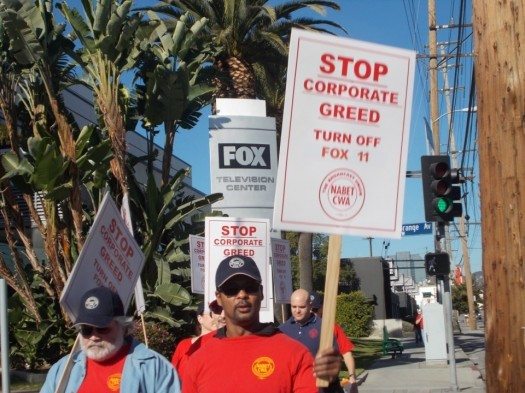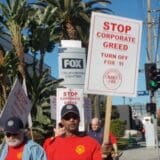

 We’re still legislating and regulating private morality, while at the same time ignoring the much larger crisis of public morality in America.
We’re still legislating and regulating private morality, while at the same time ignoring the much larger crisis of public morality in America.
In recent weeks Republican state legislators have decided to thwart the Supreme Court’s 1973 decision in “Roe v. Wade,” which gave women the right to have an abortion until the fetus is viable outside the womb, usually around 24 weeks into pregnancy.
Legislators in North Dakota passed a bill banning abortions after six weeks or after a fetal heart beat had been detected, and approved a fall referendum that would ban all abortions by defining human life as beginning with conception. Lawmakers in Arkansas have banned abortions within twelve weeks of conception.
The morality brigade worries about fetuses, but not what happens to children after they’re born. They and other conservatives have been cutting funding for child nutrition, healthcare for infants and their mothers,


 Spring equinox always arrives in what feels like the middle of winter. Snow falls in the Northwest while the Northeast tries to dig out from under the most recent storm and ice still covers Midwestern roads. Even in Los Angeles, spring does not really feel like, well, spring until sometime in late April or early May. The foundational spring stories of the Northern Hemisphere also have that hidden element.
Spring equinox always arrives in what feels like the middle of winter. Snow falls in the Northwest while the Northeast tries to dig out from under the most recent storm and ice still covers Midwestern roads. Even in Los Angeles, spring does not really feel like, well, spring until sometime in late April or early May. The foundational spring stories of the Northern Hemisphere also have that hidden element.
Passover in the Jewish tradition tells the story of a people oppressed by enslavement in Egypt, the dominant empire of its time. Over and over again terrible experiences overtake the land, but the slave masters refuse to let go. A plague of frogs is not enough. Nor locusts. Nor dying animals. Nine times the plagues come and the masters will not relent. Then, suddenly, with number ten, the slaves are released, or actually, told to leave. It could have happened after the first disaster.
» Read more about: Spring’s Awakening and the Dawn of Change »


 It’s time for California, long a leader in green energy investment, to take another big step forward on the environment and job creation.
It’s time for California, long a leader in green energy investment, to take another big step forward on the environment and job creation.
When Californians passed Proposition 39 last year, they voted for more carbon reduction, school improvements and jobs – all through a five-year, $2.5 billion program using revenues from newly closed tax loopholes to pay for investments in energy efficiency and renewable energy. Now state policymakers are making critical decisions as they craft the guidelines for this massive new investment.
School facilities are the primary target of Proposition 39 retrofitting efforts. But if the measure is going to deliver on its promises of carbon reduction, healthier schools and neighborhoods, long-term career opportunities and a timely economic boost for communities that need it the most, the proposition needs to be implemented right.
I’ve been studying the green jobs sector since its early days, and my research and observations suggest some important recommendations.
» Read more about: Going Green and Growing Jobs, the Right Way »
 An ounce of prevention is worth a pound of cure. A stitch in time saves nine. One dollar spent on contraception saves three on pregnancy and newborn care, and that is just the beginning.
An ounce of prevention is worth a pound of cure. A stitch in time saves nine. One dollar spent on contraception saves three on pregnancy and newborn care, and that is just the beginning.
Nationally, we spend 11 billion taxpayer dollars a year on unintended pregnancies. But who’s counting? Automatic cuts built into the sequester slashed $86 million from family planning and reproductive health care for poor women. But that is not enough for Congressional Republicans, who are trying yet again to roll back the contraceptive mandate. If there ever was an indication that they are more interested in ideology than balanced budgets, this is it.
Research published this fall showed that effective, affordable, accessible contraception dramatically drops the rate of unintended pregnancy and related public health costs. In the study, whose co-author explained that it was essentially designed to mimic what Obamacare would have provided,
» Read more about: Contraceptive Mandate: Another Budget Hostage »


Last week I stood with hundreds of proud Angelenos outside the Department of Water and Power headquarters in downtown Los Angeles to celebrate a momentous announcement for the city and our environment. Mayor Antonio Villaraigosa proclaimed that Los Angeles will be completely off of coal power before 2025.
It will be a monumental shift.
“It took one hundred years to build up the power supply the DWP has today,” the Mayor explained, “but in a decade and a half, we’re going to replace 70 percent of it.” “Right now, 40 percent of our power comes from coal plants. But by 2025, that number will be zero.”
With the spotlight on our city, we were joined by national environmental leaders such as former Vice President Al Gore and Sierra Club Executive Director Mike Brune.
“This is a really big deal,” Gore said emphatically. “Americans worry that government is broken,
» Read more about: L.A.’s Big Energy Shift: Goodbye Dirty Coal »
Figures are from 2009 through March, 2013. Sources: Parent Revolution; foundation tax returns; foundation grant reports. See “Public Schools, Private Agendas: Parent Revolution.”


If you’re like me, right now you may be scrambling to stock up on all of your Passover essentials. So what if I told you that you could get 12 boxes of matzah – more than enough to cover the eight days and nights of breadless revelry – for just over $40 bucks?
Ah, but there’s a catch: You’ll have to buy this miracle matzah pak at Walmart. Moral dilemma? You bet.
Last year we provided a short list of reasons you might want to think twice about a Walmart matzah binge. We wish we could report that Walmart had cleaned up its act since then, but alas, the world’s largest retailer has racked up a series of alleged corporate crimes and indiscretions that would make a pharaoh blush.
So before you succumb to those everyday low prices, here are five more reasons not to buy matzah at Walmart:
1) Hunger Strike: Remember those passages in the haggadah about the bread of affliction?
» Read more about: Five New Reasons Not to Buy Matzah at Walmart »


 “What do ex-cons and trade unions in California have in common?” With those words, KTTV Fox 11 Vice-President and General Manager Kevin Hale begins his latest editorial criticizing California’s High Speed Rail Project, specifically a hiring policy that gives preferential treatment to disadvantaged workers.
“What do ex-cons and trade unions in California have in common?” With those words, KTTV Fox 11 Vice-President and General Manager Kevin Hale begins his latest editorial criticizing California’s High Speed Rail Project, specifically a hiring policy that gives preferential treatment to disadvantaged workers.
“They are defining disadvantaged workers as former criminals and some union workers,” Hale says.
Mr. Hale is certainly entitled to his opinion about the bullet train, but when he starts lumping together criminals and union workers, I have to object.
His true anti-union colors are showing with that distortion of the facts.
Mr. Hale fails to mention in his editorial that the High Speed Rail Project also gives preferential treatment to several other groups, including veterans, single parents, former foster children, high school dropouts and the homeless.
But you’ll notice Mr. Hale doesn’t associate veterans, foster children or single parents with former criminals.


 A new economy is coming. While Wall Street banks are on a trend of corporate mergers and acquisitions, Main Street businesses are generating community wealth while undergoing a transition of their own. Traditional companies are becoming worker cooperatives, both to sustain during tough economic times and because years of success have enabled these companies to reward their workers. State and local governments are beginning to get wise to this trend, too, adding legislative influence to an already vibrant movement.
A new economy is coming. While Wall Street banks are on a trend of corporate mergers and acquisitions, Main Street businesses are generating community wealth while undergoing a transition of their own. Traditional companies are becoming worker cooperatives, both to sustain during tough economic times and because years of success have enabled these companies to reward their workers. State and local governments are beginning to get wise to this trend, too, adding legislative influence to an already vibrant movement.
Take the example of Zingerman’s Community of Businesses, an umbrella company that runs a fleet of food service outfits based in Ann Arbor, Michigan. Over the course of more than 30 years, Zingerman’s has become a statewide destination for food lovers, and their owners have become business community luminaries. Nearly 600 employees work in the eight distinct businesses that comprise the Zingerman’s Community, generating annual revenues of $46 million.


When voters approved Proposition 39 last November, they were voting for good clean-energy jobs, and energy efficiency projects in public schools and other public facilities that would save taxpayers money.
The proposition closed a corporate tax loophole and will provide up to $550 million annually in savings that, in the first four years, will go toward energy efficiency projects. An article that recently appeared in the industry press with the headline, “HVAC Contractor Ordered to Pay Nearly $1 Million for Violating Labor Law,” offers a cautionary tale for state lawmakers who are now considering how to spend those funds.
The article reports that California labor commissioner Julie Su ordered Ace Cooling & Heating Corporation, a contractor that installs heating and cooling systems for buildings, to pay nearly a million dollars in fines and wages to 10 employees for their work on a modernization project at El Camino Community College in Torrance.
» Read more about: Wage Theft Case Shows the Need for Workforce Standards »